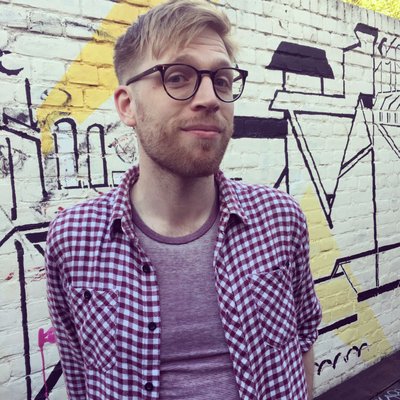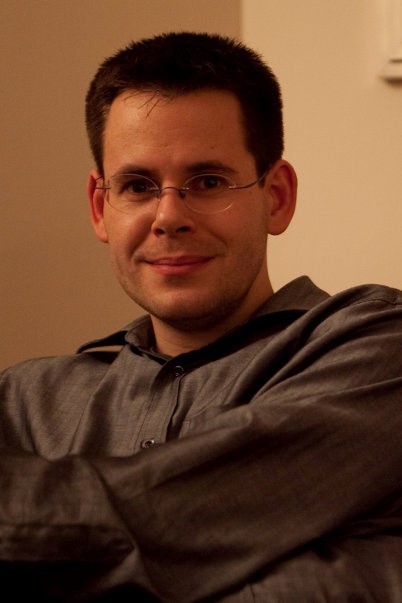10 December 2020

Kylie Crane
Kylie Crane (Potsdam)
Concrete ruins
ruins made of concrete, or specific ruins; also processes of ruining caused by concrete
Thursday, Dec 10, 6-8 pm | Zoom
In this talk, I will bring the (media representation of the) Rana Plaza collapse in Bangladesh together with Tim Edensor's urban explorations in Industrial Ruins. I draw on new materialist thought and postcolonial theory, together with Ann Laura Stoler's ideas of ruin and ruination as well as Rob Nixon's idea of slow violence, to think about ruin in an active sense, connecting otherwise seemingly disparate sites.
Kylie Crane is the author of the acclaimed book Myths of Wilderness in Contemporary Narratives (Palgrave, 2012). She teaches Anglophone Literatures and Cultures at the University of Potsdam. She was a Junioprofessor of Anglophone Literary and Cultural Studies at the University of Mainz-Germersheim (Germany). Starting 2021, she will hold the Chair of British and American Cultural Studies at the University of Rostock.
Join Zoom Meeting
https://uni-frankfurt.zoom.us/j/99255048613?pwd=a0xLcUswci9OUFZmS0NQUnJ3Nkp2dz09
Meeting ID: 992 5504 8613
Passcode: 318481
06 February 2020
Daniel O'Gorman
‘None of the Guilty Will Be Spared’: Atmospheric terror in George Brant’s Grounded
Thursday, Feb 06, 6-8 pm | Room IG 4.201
George Brant’s play Grounded (2013) takes the form of a one-actress monologue in which a fighter pilot tells the story of her forced reskilling as a drone operator after giving birth. She recounts her story on an unadorned dark stage, but as the play progresses, it becomes clear that she is in a military prison cell, having refused orders to fire a missile because she has spotted a young girl of roughly the same age as her own running across her screen. Surveilled in her cell, the watcher has become the watched, her conscience costing her her liberty. This presentation will show how Brant’s play maps an alarming new environment of technologized terror enabled by drones. Drawing on thinkers of spatial violence and justice such as Eyal Weizman, Andreas Philippopoulos-Mihalopoulos and Achille Mbembe, it will argue that Grounded makes visible an atmospheric circumscription of liveable space that is most immediately obvious in the experience of those under the drones’ watch, but that is also, more surreptitiously, present in the Pilot’s domestic life, too: an acceleration in the surveillance of not only behaviour but also thought. If, as Ian Shaw has argued, drones enable capitalism to ‘enclose’ space in unprecedented new ways, then Brant’s play demands that its viewers pay close attention to this enclosure, laying out the urgent need to resist it by – to borrow from Doreen Massey – making a powerful case for ‘a commitment to that radical contemporaneity which is the condition of, and condition for, spatiality’.
Daniel O’Gorman is Vice Chancellor Research Fellow in English at Oxford Brookes University. He is the author of Fictions of the War on Terror: Difference and the Transnational 9/11 Novel (Palgrave, 2015) and co-editor, with Robert Eaglestone, of The Routledge Companion to Twenty-First Century Literary Fiction (Routledge, 2019).
29 January 2020
Tom McCarthy
In Conversation with Pavan Malreddy & Reading from Satin Island
18:00 c.t. - Cas 1.802 (reception to follow)
Tom McCarthy is the author of four novels and two volumes of literary essays. He won the Windham Campbell Prize for Fiction in 2013. His novels have been translated into more than twenty languages and have been shortlisted for the Man Booker Prize on two occasions (C, 2010; Satin Island, 2015). His first novel Remainder was adapted for the 2015 British-German drama film under the same name. His work has drawn comparisons with major avant-garde writers of our times, including Franz Kafka and Samuel Beckett.
Tom McCarthy lives with his family in Berlin.
12 December 2019
Stephen Morton
Allegories of the World System
18:00 c.t. - room IG 411
This paper presents research from my current book project, Allegories of the World System. Against the histories of dispossession and extraction which have shaped the development of the modern world economy, the book considers how postcolonial art and literature variously draws on the resources of allegory to project a powerful dialectical image of a decolonising world. Extending Fredric Jameson’s claim that all allegories are utopian, the book traces the utopian expression of the global commons in the allegorical form of postcolonial literature and visual culture. Since utopian thought has always been concerned to counter the rule of property, it is particularly well placed to articulate the collective work of ‘commoning’, which Pierre Dardot and Christian Laval (2019) see as crucial to addressing the political, economic, and ecological crises of the twenty-first century. Moreover, the utopian impulse of postcolonial allegory has sought to imagine alternatives to the histories of colonial dispossession, extraction, ecological devastation, social reproduction, and labour exploitation, which have shaped and determined the development of the modern world–system. Through original comparative readings of a wide range of literary texts by Chinua Achebe, Cyprian Ekwensi, Zakes Mda, Helon Habila, Tomson Highway, M. NourbeSe Philip, and Maryse Condé, and visual artworks by Sondra Perry, William Kentridge, Steve McQueen, Nadia Myre, and Brian Jungen, this book argues that the allegorical codes of postcolonial world literature and art engage readers in the collective work of reimagining the planet as commons.
Stephen Morton is a Professor of English at the University of Southampton. He recent books include States of emergency: colonialism, literature and law (Liverpool University Press), co-edited collections, Terror and the postcolonial: a concise companion (Wiley-Blackwell) and Foucault in an age of terror: essays on biopolitics and the defence of society (Palgrave).
14 November 2019
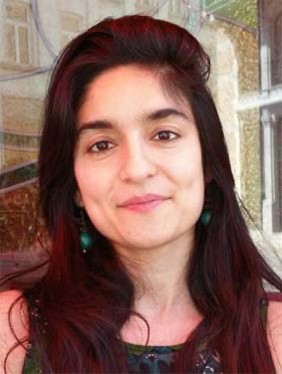
Maryam Mirza (Durham University)
"Resisting Activism: The Politics of Apathy and Disengagement in South Asian Women’s Fiction"
18:00 c.t. - room IG 4.201
My talk will draw on an ongoing book project which focuses on the theme of resistance in Anglophone fiction by South Asian women writers. Moving beyond a conceptualization of resistance developed purely in response to colonialism and/or patriarchal oppression, my book calls attention to the emancipatory politics, contradictions and disturbing manifestations of resistance, as well as its ambiguous affective implications. Through the lens of Manju Kapur’s novel Difficult Daughters (1998), and Kamila Shamsie’s Broken Verses (2005), my talk will grapple with the depiction of political apathy and disengagement in the context of two significant moments of female activism in contemporary South Asian history: the anti-colonial nationalist movement during the years leading up to the Partition of India in Kapur’s novel, and General Zia-ul-Haq’s military dictatorship and his Islamization movement in Shamsie’s. Deploying an interdisciplinary framework, I will examine the ways in which political apathy in these texts is intimately bound up with the concepts of freedom, choice and agency and, more broadly, with fundamental questions of female identity.
Maryam Mirza is Assistant Professor in World Literatures in English at Durham University, UK. Her first monograph Intimate Class Acts (2016) was published by Oxford University Press, and her essays have appeared in journals such as The Journal of Commonwealth Literature and the Journal of Postcolonial Writing, as well as in anthologies. She is currently working on her second monograph, which is under contact with Manchester University Press and is provisionally entitled Resistance and Its Discontents in South Asian Women’s Fiction.
11 July 2019
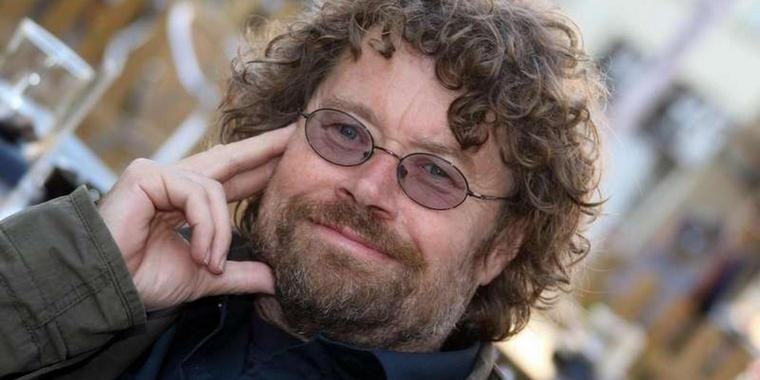 Elmar Schenkel (Universtity of Leipzig)
Elmar Schenkel (Universtity of Leipzig)
"Interlopers: Mapping Creative and Destructive Encounters between Asia and the West"
18:00 c.t. - room IG 1.414
This talk aims to uncover a pattern of encounters East/West by looking at biographical and ideological lines that cross and fertilize each other in many ways. This may result in very creative and productive encounters, which might change consciousness or lead to more reflectivity, but also in ideological abuse or simply misunderstanding. I shall be concerned with intellectuals and spiritual seekers like C.G. Jung, Rabindranath Tagore, Mme Blavatsky, Sri Aurobindo, Mira Alfassi, Alexandra David-Néel, Savitra Nevi, the Beatles, Lafcadio Hearn et al. Among them we shall find forgers, frauds and fortune-seekers, as well as mystics, impressionists and thinkers, or ideologists and fascists. The focus will be on encounters between the West and China, Tibet, Japan and India during the 19th and 20th centuries. Eventually the outlines of a map may appear that will show the extent to which the ‚East‘ and the ‚West‘ are parts of a great work of fiction.
Elmar Schenkel has been Chair of British Literature at the University of Leipzig until 2019. He is also a writer, translator and artist. His research interests focus on the relationship between science, religion and literature. Recent books include Keplers Dämon – Wechselbeziehungen zwischen Literatur, Traum und Wissenschaft (S. Fischer 2016), Transsilvanien Express (Hamouda 2017) and Anruf aus der Kreidezeit – Aphorismen und andere Alphornissen (Isele 2019).
27 June 2019

Colin Graham (Maynooth Universtity)
‘A real event in slow motion’: (Northern) Irish Poetry After Brexit’
18:00 c.t. - room IG 1.414
The event of Brexit, as it unfolds uncertainly, has the capacity to change the political and cultural landscape of Northern Ireland. This paper considers the potential effects of Brexit on Northern Ireland by examining what Brexit is, what it thinks it is, and what critical paradigms, in an Irish context, offer themselves to understand Brexit. While the course of Brexit seems to collide with the actuality, and certainly the spirit, of the Good Friday Agreement, culture, and specifically poetry, in Northern Ireland over the past twenty years has been attempting to comprehend the effects of post-Agreement culture on the nature of the political self. How will Brexit reconfigure that self, and what effect might the political realignment of a post-Brexit culture have on the way in which the voice of Northern Irish poetry expresses itself?
Colin Graham is Professor and Head of English at Maynooth University, Ireland. His books include Northern Ireland: 30 Years of Photography (2013), Deconstructing Ireland (2001) and Ideologies of Epic (1998), and he is co-editor of three collections of essays. He co-edits The Irish Review and is curator of the Illuminations gallery space at Maynooth University. He is currently working on a book on Brexit and Northern Ireland.
23 May 2019
Florian Stadtler (University of Exeter)
Narrating Globalisation, Contesting Politics
of Space in the Work of Amitav Ghosh
18:00 c. t. - room IG 4.201
Much attention has focused on the South Asian novel’s connection to nation, language and its impact on processes of narration. However, the question of history and its relation to wider questions of genre have thus far been situated more on the margins of these debates. This talk will consider, through an analysis of the Ibis trilogy by Amitav Ghosh, how the historical novel approaches the issue of globalisation and how a re-examination of Empire and its rhetoric of free trade allows for a recalibrated view of the contemporary. How do the novels challenge ideas of nationalism and thenetworked globe and how can the colonial archive be used to further
investigate these issues? How do Ghosh’s engagements with indentured labour and slavery coalesce with the modern period? Does it enable us to consider further the silenced voices that are excluded from historical and contemporary considerations of an economic logic of progress and
modernity? I seek to investigate some of the textual and rhetorical strategies with which Ghosh animates these questions and consider how the novel as a literary form has responded and questioned the processes of globalisation, and how a postcolonial reading practice allows us to further our understanding of colonialism and its consequences in a globalising world.
Florian Stadtler is Senior Lecturer in Postcolonial Literatures at the University of Exeter, UK. He has published on South Asian Writing in English, Indian Popular Cinema and British Asian Literature and History. His monograph Fiction, Film and Indian Popular Cinema: Salman Rushdie’s Novels and the Cinematic Imagination is published by Routledge. He is Reviews Editor of Wasafiri: The Magazine of International Contemporary Writing.
09 May 2019
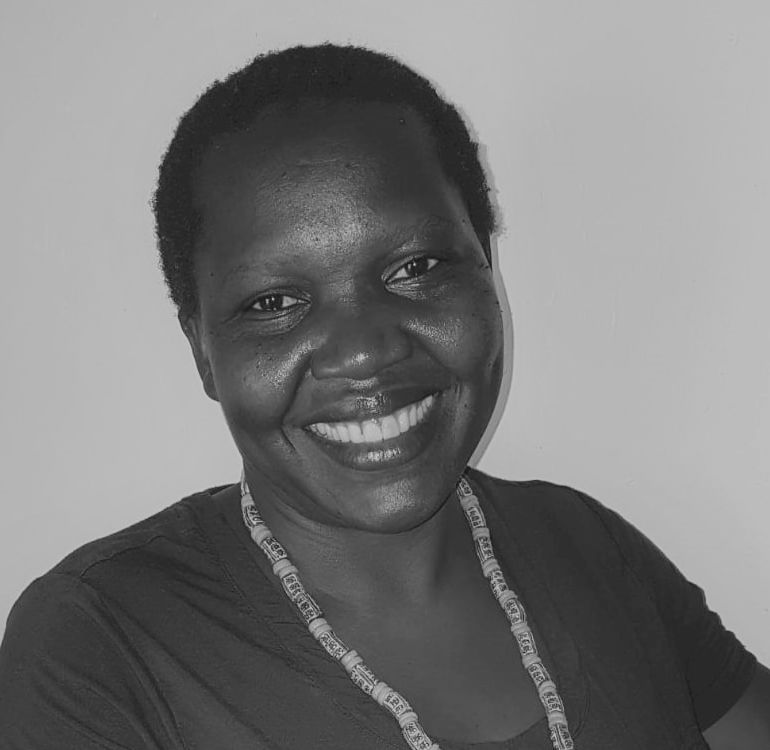 Beatrice Lamwaka:
Beatrice Lamwaka:
Queer Writing in Uganda – The Struggle for Literary Space
18:00 c. t. - room IG 4.201
Uganda today is vibrant with literary activities − poetry performances, book clubs, publishing, public readings − despite repressive laws that limit freedom of expression. With the 2021 elections forthcoming, spaces are becoming narrow and narrower. The internet, which should have provided spaces for writers, sometimes is used against them to systematically harass, intimidate and stifle government critics under the Computer Misuse Act − charges Dr. Stella Nyanzi. Some writers have resorted to self-censorship. Writing stories with queer characters has been shunned by writers, while readers want a nice story. Yet women writers have excelled in a space which is patriarchal. Many are nurtured by FEMRITE (the Ugandan women writers’ association), and some have received national and international recognition for their writing. Emerging writers are nurtured by established writers; creative writing work-shops are held (even in prisons) to encourage new voices. Writers have started initiatives with no or limited support from the government, and all these initiatives are encouraging and promoting reading and writing in Uganda.
Beatrice Lamwaka is a reporter with Global Press Institute. Her collection of short stories, Butterfly Dreams and Other Stories, was published in 2016.
25 April 2019
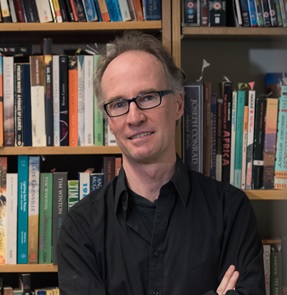 Geoffrey Rodoreda:
Geoffrey Rodoreda:
Australia’s Postcolonial Turn: the Mabo Decision and Australian Fiction
18:00 c. t. - room IG 4.201
More than any other event in Australia’s history, the Mabo decision of 1992, which legally recognised Indigenous Australians’ occupation and ownership of the continent, has challenged previous ways of thinking about land and space, settlement and belonging, race and relationships, and nation and history. It has had a profound impact on law, politics and culture, as well as on the nation’s literary imaginary. This talk examines contemporary Australian fiction writing’s substantial engagement with Mabo’s cultural legacy, that is to say, with the acknowledgement of Indigenous peoples’ presence in the land, in history, and in public affairs, as opposed to their absence. Via readings of both Aboriginal and non-Aboriginal texts, I will argue that what is now called ‘post-Mabo fiction’ has turned Australia postcolonial.
Geoff Rodoreda is a lecturer in the Department of English Literatures at the University of Stuttgart. In a previous life he studied politics and journalism in the city he grew up in, Sydney, Australia, and worked as a journalist in Australia and Germany. In 2012, he gave up journalism to concentrate on academic teaching and on writing a PhD, which he completed in 2016 and which has resulted in a book, The Mabo Turn in Australian Fiction (Oxford: Peter Lang, 2018).
17 January 2019
Birte Heidemann-Malreddy (Bremen):
Towards a Narrative of (Re)Conciliation? Post-War Sri Lankan Literature in English
18:00 c. t. - room IG 4.201
We are fast approaching the tenth anniversary of the end of Sri Lanka’s three decades long civil war between the army and the insurgents of the Liberation Tigers of Tamil Eelam (LTTE). And yet, since the war’s brutal ending in May 2009, the Sri Lankan governments – old and new – have not been engaged in any serious efforts to address the country’s longstanding political challenge of competing ethno-nationalisms, let alone to pursue the transitional justice policies promised to the UN Human Rights Council. The government’s very deferral of political actions in addressing its reconciliation agenda has opened up a niche for negotiation in the domains of art, literature and cultural politics. This holds particularly true for the burgeoning body of Sri Lankan literature in English – novels, poetry, autobiographies and narrative journalism – that has forged a counter-narrative to an increasingly institutionalised politics of truth, forgiveness and peace-building.
Given the island’s complex legacy of colonisation by three different empires, this talk contends that the very notion of reconciliation is inadequate, if not unattainable, in a Sri Lankan context. To reconcile suggests a return to a prior stage of conciliation which, for postcolonial societies, has never existed in the very first place (McGonegal 2009; Christie 2009). With this in mind, my talk sets out to explore the amorphous nature of the reconciliation discourse through three interrelated conceptual frames – suffering (Levinas), consolation (Simmel; Blumenberg; James) and disconsolation (Lazarus; Wright). The discussion draws attention to the ethical limits of reconciliation, something that has found a renewed expression in the emergent canon of post-war Sri Lankan literature. My reading of select texts – fiction and non-fiction – engages with how the various narrative strategies deployed are devised to confront us with daunting ethical questions about the country’s unresolved narrative of (re)conciliation.
Birte Heidemann-Malreddy is a Postdoctoral Researcher at the Chair of Postcolonial Literary and Cultural Studies, University of Bremen, Germany. Her research interests are in postcolonial theory, literary and cultural expressions of post-conflict societies, particularly Northern Ireland and Sri Lanka, and post-9/11 fiction. She is the author of Post-Agreement Northern Irish Literature (Palgrave, 2016) and co-editor of From Popular Goethe to Global Pop (Rodopi, 2013), Reworking Postcolonialism (Palgrave, 2015) and two special editions of the Journal of Postcolonial Writing (vol. 47.5 and 48.3). She is currently working on a book-length study of post-war Sri Lankan Anglophone literature.
15 November 2018
Lecture series "Afrasian Futures"
Yvonne Adhiambo Owuor (Nairobi/Berlin):
The Return of the Admiral: Re-fashioning Swahili waters in the 'Dragonfly Sea'
18:00 c. t. - room IG 411
What does China’s creeping return to Eastern Africa, by way of the seas, portend for intimate and personal histories of a people whose far and deep life stories are embedded in these waters? What future might the 'Swahili Seas' imagine for themselves in an ongoing (yet subtle) confrontation with the tremendous weight of China’s ambitions that encompasses a mutually remembered past? Yvonne Owuor’s forthcoming novel, The Dragonfly Sea (to be published in early 2019), is a micro-story of the vast Western Indian Ocean (Swahili Seas) narratives and focuses on a young woman’s coming-of-age on Pate Island, Lamu Archipelago, Kenya, a mostly ‘unnoticed’ space, yet one of tremendous import to significant ‘Indian’ Ocean happenings, including and in particular, China’s East African return. The lecture is a creative exploration of the themes in The Dragonfly Sea which also highlights aspects of the intimacies that bind a small, time-warped Kenyan Island with a giant China that has stepped out with quiet but potent force into the world.
Yvonne Adhiambo Owuor is a writer from Nairobi, Kenya. She studied English and History at Kenyatta University, earned a Master of Arts degree at the University of Reading, UK and later received an MPhil (Creative Writing) from the University of Queensland, Brisbane. Her story “The Weight of Whispers” won her the Caine Prize for African Writing in 2003. Her debut novel, Dust, published in 2014 was the winner of the 2015 Jomo Kenyatta Literature prize. Her second book, The Dragonfly Sea (Knopf) will be available from March 2019. She is at present at the Wissenschaftskolleg zu Berlin, working on her third novel with the working title The Long Decay.
1 November 2018
Campbell Jefferys:
Soundtrack included:
How music adds an extra layer of storytelling to a Bildungsroman
18:00 c. t. - room IG 411
Award-winning Australian author Campbell Jefferys talks about his latest book, Rowan and Eris, a coming-of-age novel about redheads, musicians, pranksters and parents, and which includes an original soundtrack, One Hand Clapping. Campbell will talk about the genesis of the idea, how the story took shape, the creative decisions made along the way, and why it became imperative for the music to be written and recorded. But how does the music accompany the story? Is the soundtrack an epilogue, heard once the book is finished? Or is it an interlude, with each song listened to at the point it’s mentioned in the book? As the talk delves deeper into the power of music, it should open the door to a lively discussion about the role, if any, soundtracks can play in literature.
24 October 2018
Mala Pandurang (Mumbai):
Bandhani, emankeeki and kanga – Three Sisters of an Asian-African Heritage. The Complexities of Gendered and Race Relations in the Work of Sultan Somjee
18:00 c. t. - room IG 454
My talk will focus on two novels by Sultan Somjee, a fourth generation Asian African born and raised in Kenya, now located in Canada. Somjee’s first novel Bead Bai (2012) engages with the emankeeki, a beaded ornament worn by married Maasai women. He reinserts into Eastern African history the forgotten life narratives of a group of Indian women known as ‘Bead Bais’ who enabled the flow of coloured beads between the dukawallahs and the indigenous tribes that impacted the expressions of African aesthetics. In his second novel Home Between Crossing, (2016) Somjee engages with the kanga (‘the cloth that speaks wisdom’) as a trope to explore the meeting of the cultures of land and oceanic migrations. I will explore how Somjee’s work offers a fascinating reconstruction of the transnational life histories of Ismaili Khoja women from India to East Africa from the early 20th century to the 1960s, and then the double diaspora to Canada in the post-independence period. My interest is in Somjee’s use of the tropes of material artefacts such as the bandhani (Khoja), emankeeki (Maasai) and kanga (Swahilli) to explore an imaginative space drawn from the interface of feminine art, aesthetics and ideas of both settler Asian and African indigenous cultures. I will particularly focus on how Sultan draws from the oral, the visual and the embodied to address complexities of gendered and racialized Asian-African race relations under British colonialism and African nationalism.
Mala Pandurang is Professor and Vice Principal at Dr. BMN College, Mumbai (affiliated to SNDT Women’s University). She is a postdoctoral alumna of the Alexander von Humboldt Stiftung (AvH). She has taught as Fulbright Visiting Professor at the University of Texas at Austin, and is also a recipient of the Charles Wallace In-UK Research grant. She has also received a Major research grant from the University Grants Commission (New Delhi). She is the Reviews Editor of the Journal of South Asian Diaspora (Taylor and Francis) and series editor of Postcolonial Lives (Brill). Her areas of research are postcolonial writing, diaspora theory and gender studies and she has published extensively on the same. In 2012 she received the SNDT Women’s University ‘Maharshi Karve Utkarshta Shikshak Puraskar’ (Best Teacher Award) from the Governor of Maharashtra.
3 May 2018
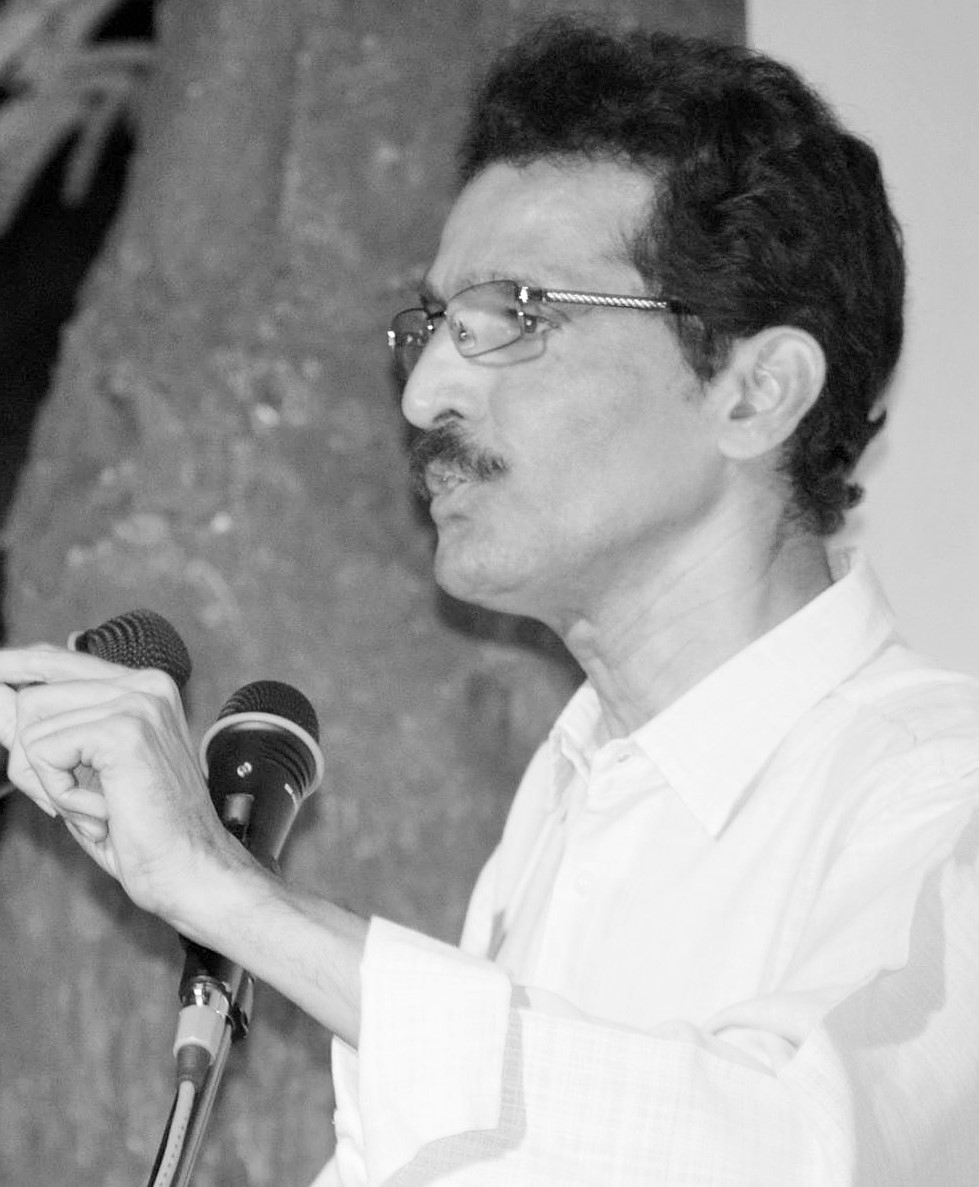 Venugopalrao Nellutla:
Venugopalrao Nellutla:
Ngũgĩ in India: A Transcultural Dialogue
18:00 c. t. - IG 4.201
The talk will explore the dynamics of transcultural dialogue between Telugu-speaking areas of India and the legendary Kenyan writer Ngũgĩ wa Thiong’o. Though separated by more than 5,000 km distance and without any common bonding in political, social, cultural and economic relations, how this Gikuyu author got a familiar treatment as one of their own authors and commanded highest respect, goes beyond literary appreciation. It has to do with a collective memory of oppression and struggle. It is a kind of discovery of one’s own self in a literature from afar. It is an attempt to draw inspiration for one’s own continuing struggles. In this transcultural dialogue, cultural differences become secondary to political unity. I would also like to give a personal touch to this line of argument by referencing the interactions many Telugu people and I had with Ngũgĩ in the course of last two decades and more.
Venugopal Nellutla is a student of political economy by training, but remained poet, translator, literary critic, journalist and public speaker by choice. Working in both Telugu and English mainstream journalism for more than two decades, he left it to launch Veekshanam, an alternative, small Telugu monthly journal of political economy and society which he has been editing for the last 15 years. He has about 25 books in original Telugu and translated as many into Telugu from English, besides editing more than 20 books. His recent publications include Understanding Maoists: Notes of a Participant Observer from Andhra Pradesh (Setu Prakashani, Kolkata, 2013)
8 February 2018
 Alex Tickell:
Alex Tickell:
Can the Slum-dweller Speak? Katherine Boo and the Postcolonial Politics of Literary Journalism
18:00 c. t. - IG 4.201
My paper examines the rise of forms of narrative reportage and creative non-fiction in representations of the city and urban subaltern communities in India. Drawing on my recent research on citizenship, infrastructure and writings on the city, I will discuss the postcolonial ethics and politics of literary journalism with special reference to Katherine Boo’s celebrated account of Mumbai’s Annawadi settlement, Behind the Beautiful Forevers: Life, Death and Hope in a Mumbai Slum (2012). My aim is to theorise Boo’s use of first-person narrative voices in this text, and contrast this fictionalising technique with Aman Sethi’s ‘involved’ narrative reportage in his work of the same year: A Free Man: A True Story of Life and Death in Delhi (2012).
1 February 2018
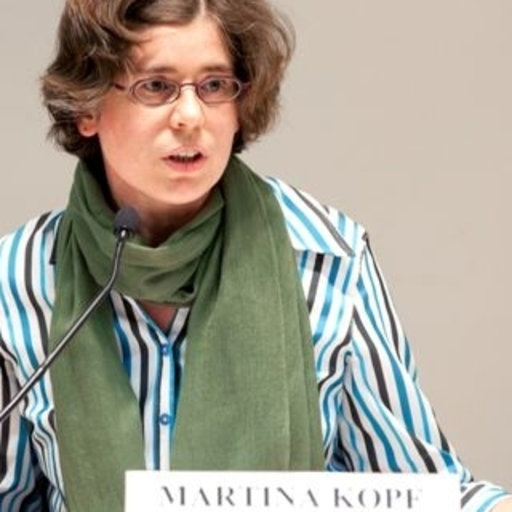 Martina Kopf:
Martina Kopf:
Concepts of Development in Postcolonial Kenyan Writing
18:00 c. t. - IG 4.201
In his seminal work on the colonial origins of developmentalism in Africa in the first half of the 20th century, Frederick Cooper proposes that at its very roots there is a problem of knowledge. Colonial officials approached social phenomena with a specific gaze, one that thought that European solutions are applicable anywhere in the world. This problem of knowledge did not disappear with the end of colonial rule. Rather, it went into the post-colonial governance of processes of social and economic change in Africa and was re-inforced through international institutions and organisations in development politics and planning. This ‘not-knowing-enough’ or ‘not-knowing-the-right-things’ runs through the history and critique of development research and planning.
The habilitation project presented in this talk engages with the issue of knowledge in discourses and politics of development, by looking at them through the lens of Kenyan writing. I am interested in how writers from a country that has been a watershed for the international development industry for the wider region of East Africa have witnessed, experienced and shaped what the Latin American anthropologist Arturo Escobar (1991; 1995) has termed the ‘development encounter’ in his deconstruction and critique of Western-dominated epistemologies and practices in global development politics. My purpose is to understand a part of global history and of the history of globalisation through the stories told in fiction and life writing. The fundamental questions which inform this investigation of versions and subversions of development discourse in fiction are: How do we know about social and economic change? Who defines what change is, what change means, and for whom?
Martina Kopf is lecturer in African Literature Studies at the University of Vienna. She is the author of Trauma und Literatur: Das Nicht-Erzählbare erzählen – Assia Djebar und Yvonne Vera.
7 December 2017
Nadia Butt, University of Giessen:
‘Travelling Cultures’: Reading Nineteenth-Century British Narratives about Movement and Mobility
18:00 c. t. - IG 4.201
 In the last years, the idea of ‘travelling cultures’, particularly expounded by American anthropologist James Clifford, has captured the imagination of a significant number of historians, philosophers, anthropologists, cultural and literary studies scholars who are actively engaged with it. Indeed, a number of theories have also recently emerged around this notion such as ‘travelling concepts’ expounded by Doris Bachmann-Medick or ‘travelling memory’ by Astrid Erll, which seem to be an interesting offshoot of travel as a metaphor of cultural transgressions and personal transformations. I take modern, interdisciplinary concepts of travel and deliberately choose to go back in time to address travel from a different perspective in order to develop innovative approaches to various forms of travel in British literature in the long nineteenth-century – travels which are not necessarily connected to the idea of British colonial expansion alone, but how an individual, a family or a community (often caught between cultures) is shaped by temporal, spatial, existential or spiritual journeys or pilgrimages.
In the last years, the idea of ‘travelling cultures’, particularly expounded by American anthropologist James Clifford, has captured the imagination of a significant number of historians, philosophers, anthropologists, cultural and literary studies scholars who are actively engaged with it. Indeed, a number of theories have also recently emerged around this notion such as ‘travelling concepts’ expounded by Doris Bachmann-Medick or ‘travelling memory’ by Astrid Erll, which seem to be an interesting offshoot of travel as a metaphor of cultural transgressions and personal transformations. I take modern, interdisciplinary concepts of travel and deliberately choose to go back in time to address travel from a different perspective in order to develop innovative approaches to various forms of travel in British literature in the long nineteenth-century – travels which are not necessarily connected to the idea of British colonial expansion alone, but how an individual, a family or a community (often caught between cultures) is shaped by temporal, spatial, existential or spiritual journeys or pilgrimages.
So, the lecture seeks to demonstrate how the new concept of ‘travelling cultures’ with reference to transculturation is helpful in reading nineteenth-century British narratives of travel and mobility. By exploring the connection between travel and transculturation, I aim to present my own theory of travelling culture in relation to the theory of transculturation as put forward by Fernando Ortiz and the transcultural by Frank Schulze-Engler and using it as a reading methodology. I set out to argue that various kinds of nineteenth-century genres such as poems, novels, short stories, memoirs, sketches, journals, and fictional travelogues reveal not only a variety of cross-cultural and cross-borders encounters, making us look at history and territory as well as culture and ethnicity as overlapping, but also how the experience and practice of travel by foot, by stagecoach, by horse, by sea or by boat draw our attention to a large variety of travellers in the domain of literature. It is the figure or the character of the traveller and his or her motifs behind travel is what is absolutely crucial to my understanding of the literary representation of travel. For it is by focusing on the types of travellers and their expectations before and after travel that I am able to develop deeper insight into the role of travel in shaping the traveller’s transcultural imagination and his or her cultural stereotypes. In fact, the emotional impact of travel on the traveller and his or her ‘tales’ or narrative is equally fundamental to my main argument as I seek to scrutinise them critically.
To explore the wider dimensions of travel and mobility, I will bring together my selected texts under the following categories: the suffering travellers, the curious travellers, the critical travellers and the ‘strangers’ as travellers. My selected readings include works by Lord Byron, Emily Eden, George Francklin Atkinson, James Wills, Francis Trollop, Henry James, Sir Arthur Canon Doyle and Bram Stoker among others, most of which make us ‘travel to distant geographies’. By addressing travel not only as a quest, but as a life changing experience, particularly its role in individual and cultural transformations across territorial and geographical divisions, I try to shed new light on ‘literature of travel’ and ‘travel in literature.’ Starting off with analysing selected texts in the romantic period and moving onto texts in the Victorian era and modern period, I plan to place travel in the historical framework in order to examine its representation from different angles in the realms of British literature.
Nadia Butt is lecturer in English in the department of British and American Studies at the University of Giessen, Germany. She did her PhD with Prof Frank Schulze-Engler in 2009. She is the author of Transcultural Memory and Globalised Modernity in Contemporary Indo-English Novels published in 2015. She has taught British and Postcolonial literatures at the University of Frankfurt and the University of Muenster. She has mainly published articles in the area of transcultural literatures in English. Her main areas of research are transcultural theory, memory studies, South Asian Anglophone literatures and travel literatures. Currently, she is working on her post-doctoral project which is based on travelling cultures and nineteenth-century British literature.
26 October 2017
Ranjan Ghosh (University of North Bengal):
In Transition: The Aesthetics and Politics of the ‘Across Factor’
6pm c.t. - Casino 1.812
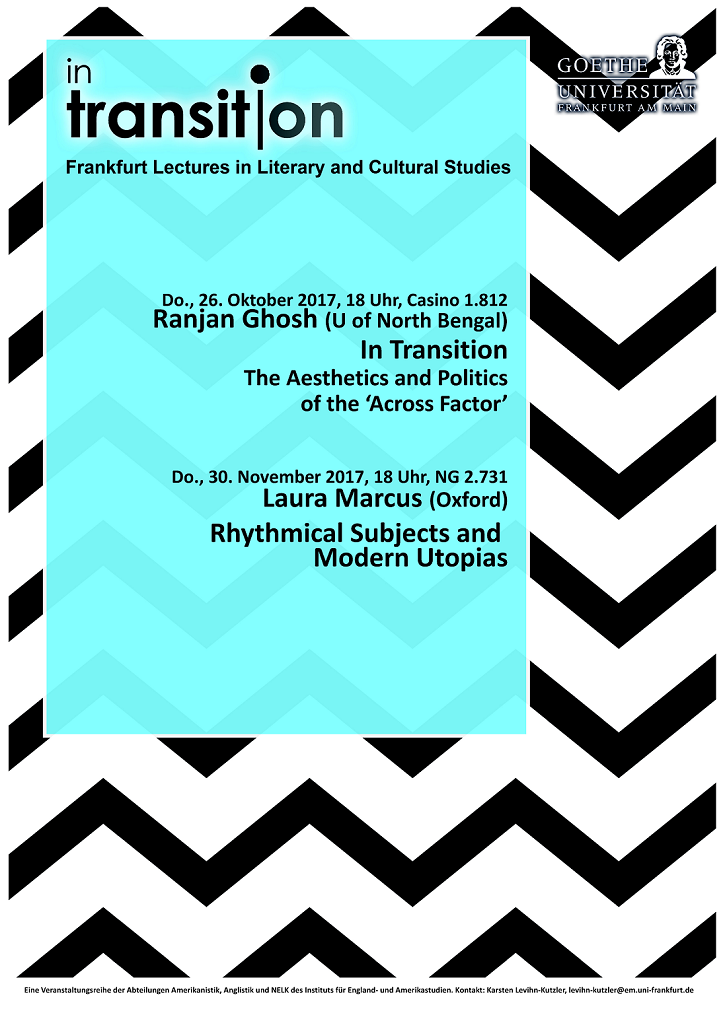 Over the last decade, I have invested myself in framing critical departures and discriminative correspondences between disciplines, across the humanities and sciences, training myself in poetics and philosophy across cultures both European and non-European. This sustained investment has resulted in the emergence of a conceptual/philosophical/epistemological space that I call “trans-(in)fusion”. It is this space that has inspired and nourished both my reading and writing. This ‘thinking’ space has eased me into making intellectual articulations across paradigms and epistemes, cultures of thought and establishment – a trans-(in)fusioned understanding of issues and ideas whether in the studies of religion, philosophy of history and historiography, memory studies, critical theory, continental philosophy, theories of literature, world literature, body theory, comparative aesthetics, educational philosophy, or the philosophy of sciences. Is critical thinking always in transition? My talk will explain what I mean by trans(in)fusion, trans-habit, intra-active transculturality, aesthetic imaginary, trans-thinking (conceptual coinages that have settled into the international comparative/ world literature vocabulary) to reformulate how we produce knowledge and reconfigurate discursive and disciplinary thinking.
Over the last decade, I have invested myself in framing critical departures and discriminative correspondences between disciplines, across the humanities and sciences, training myself in poetics and philosophy across cultures both European and non-European. This sustained investment has resulted in the emergence of a conceptual/philosophical/epistemological space that I call “trans-(in)fusion”. It is this space that has inspired and nourished both my reading and writing. This ‘thinking’ space has eased me into making intellectual articulations across paradigms and epistemes, cultures of thought and establishment – a trans-(in)fusioned understanding of issues and ideas whether in the studies of religion, philosophy of history and historiography, memory studies, critical theory, continental philosophy, theories of literature, world literature, body theory, comparative aesthetics, educational philosophy, or the philosophy of sciences. Is critical thinking always in transition? My talk will explain what I mean by trans(in)fusion, trans-habit, intra-active transculturality, aesthetic imaginary, trans-thinking (conceptual coinages that have settled into the international comparative/ world literature vocabulary) to reformulate how we produce knowledge and reconfigurate discursive and disciplinary thinking.
Ranjan Ghosh is Professor of English at the University of North Bengal in India. His publications include (In)fusion Approach: Theory, Contestation, Limits (University Press of America, 2006); Edward Said, the Literary, Social and the Political World (London: Routledge, 2009); A Lover’s Quarrel with the Past: Romance, Representation, Reading (Oxford: Berghahn, 2012), Making Sense of the Secular (London: Routledge, 2012); Presence (Ithaca: Cornell University Press, with Ethan Kleinberg, 2013); Thinking Literature across Continents (Durham: Duke University Press, 2016, with J. Hillis Miller); Transcultural Poetics (London: Routledge, 2017); Aesthetics, Politics, Pedagogy, Tagore: Towards a Transcultural Philosophy of Education (London: Palgrave Macmillan, 2017); Philosophy and Poetry: A Continental Perspective (New York: Columbia University Press, 2018).
13 July 2017
Enrique Galvan-Alvarez:
Sovereignty On Camera: Documentary, Performance and War in Syria
18:00 c. t. - IG 4.201
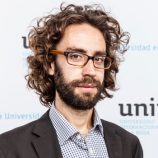
As the Syrian revolution, which began as a peaceful grassroots movement, became militarised in 2012, the Syrian government started losing ground in different parts of the country. From the early days, these ‘liberated areas’ became experimental spaces of difference where new forms of governance were implemented. In disparate ways, they aimed to prefigure the post-revolution, post-Assad era. However, as early as Spring 2013 there were plenty of cases of corruption, power-abuses and brutality in the areas controlled by the Free Syrian Army (FSA) (Yassin-Kassab and al-Shami, 2016: 127), which seemed to mimic the ways of the Assad regime. As a reaction, many fighters and civilians turned towards Islamist principles as a guarantee of order and as an alternative to both the perceived lawlessness of the secular opposition and the relentless brutality of the government. By late 2013 infighting between opposition militias, and between conflicting visions of sovereignty, had become rampant, seeing the emergence of old jihadi ghosts from the post-9/11 imaginary and, in the process, attracting much journalistic attention.
The breadth of documentaries produced about the Syrian war is incredibly large. Given that this is an ongoing conflict, which has attracted great attention and involvement from global players, the propagandistic nature of many of these documentaries is overt and their proliferation can be seen as a filmic avatar of the war itself. These war documentaries are part of a documentary war in which image, information and emotional involvement have become weaponised in a heavily media-mediated war. In order to offer a brief introduction to the genre I will assess a few examples of both religious and secular sovereignty performed for journalists working for a variety of media outlets. Many of these documentaries are shot inside religious sovereignties, and they at once replicate and challenge some of the representational trends of the post-9/11 gothic. By directly showing the human faces and voices of Islamist fighters, these war documentaries debunk the narrative of the shapeless, anomalous, faceless threat of jihadism. On the other hand, by giving voice to the fighters’ threats and depicting their violent acts they also confirm the monstrous image of the post-9/11 oriental. These ambiguous and often contradictory representations lie as much with the subjects’ desired self-presentation in front of the camera, as with the agendas of filmmakers behind the camera. The representational pact also includes a unique feature: these documentaries are not only raw accounts of the daily reality of war, but also opportunities to perform the state for the camera. From this angle, the fighters do not only appear as destroyers but as builders of a new order, thus complicating the image of the jihadi as an irrational, nihilistic and wild subject.
Enrique Galvan-Alvarez is a lecturer at Universidad Internacional de La Rioja-UNIR. His doctoral research was focused on the English-language poetry written by diaspora and exiled Tibetans. His post-doctoral research has been largely concerned with the emergence of postcolonial states and anti-colonial anarchism. Enrique has published a monograph on modern Indian fiction and its connections to the pre-modern and pre-colonial, along with many journal articles and book chapters on Tibetan-English literature, postcolonial nation building and the use of religious narratives to either legitimate or resist the state in Japan, Syria and the Canary Islands.
6 July 2017
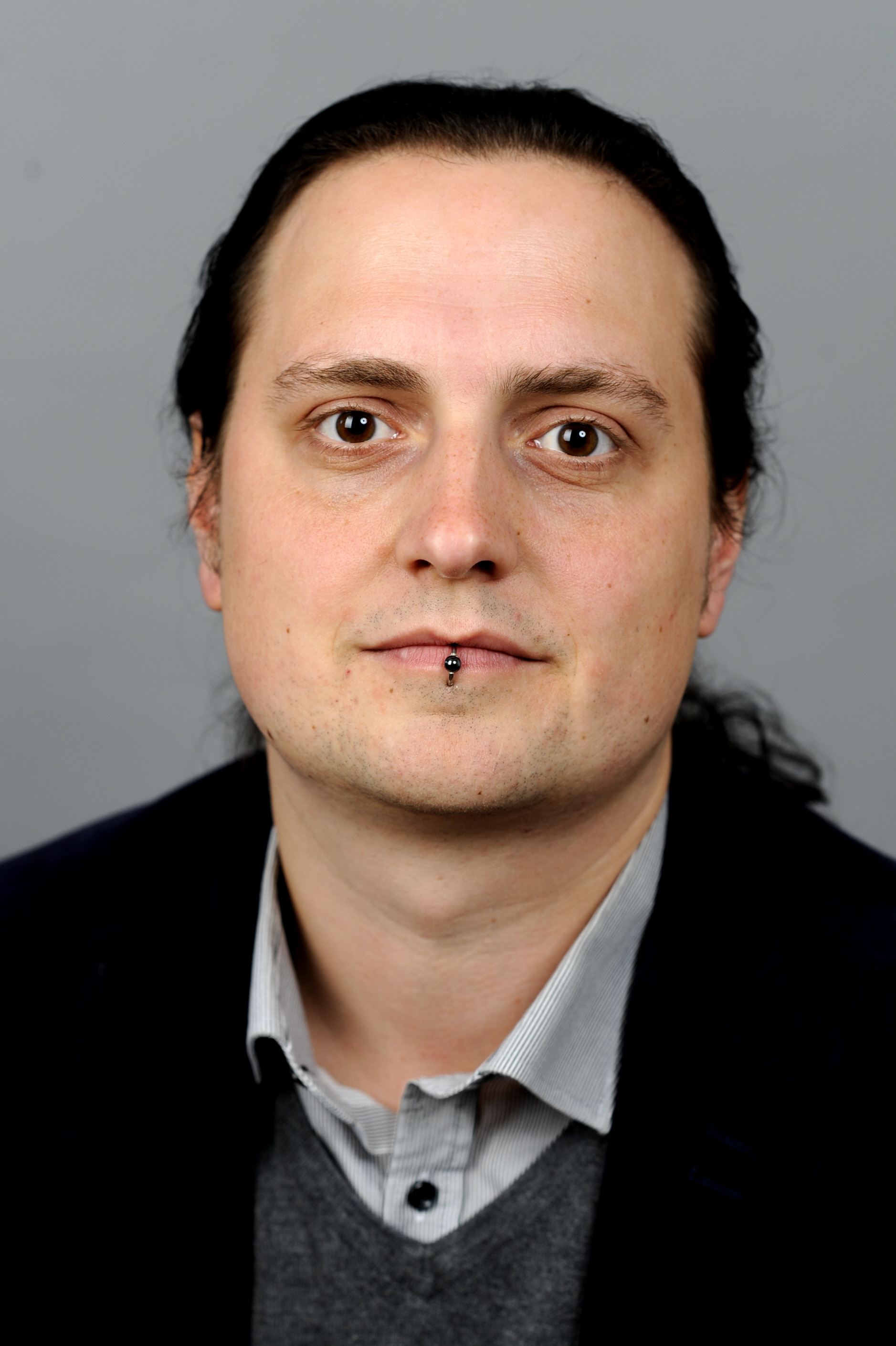 Roman Bartosch:
Roman Bartosch:
Towards Transcultural Ecology: Learning | Reading
18:00 c. t. - IG 4.201
The ‘New World Literature’. The ‘Anthropocene’. Two of the most recent and most vitally flourishing critical concepts currently discussed in literary studies seem to demand a move towards a planetary scale. Not only may this move conflict with traditional tenets of poetics and interpretation because, as Dominik Head says, the notion of the planetary ‘may contradict the way in which the novel’s role as a social medium is usually articulated’ (2000, 237). It moreover leads to ‘derangements of scale,’ as Timothy Clark has repeatedly shown: When we talk, for instance, about environmental crises and the global, the novel’s ‘scale includes the whole earth but when it comes to relating the threat to daily questions of politics, ethics or specific interpretations of history, culture, literature, etc., the map is often almost mockingly useless’ (2012, 148-9).
In this light, I suggest a notion of transcultural ecology that draws on both postcolonial and cultural-ecological writing on scale and suggest that we may learn to read novels on several, often contradictory, scales at once. Such an ecology needs to be transcultural in the sense that only a dialogue between various interpretive scales may provide insights on the blind spots in both postcolonial and ecocritical systems of thinking and imagining planetarity, and it needs to be transcultural in the sense of being aware that the very distinction between different cultures implies an a priori notion of cultural difference that, again, has its place on a particular scale as well. This will allow us to take full advantage of the ‘trans-’ of transculturalism: not only through but also beyond what is usually captured by the term ‘culture.’
Clark, Timothy (2012). ‘Derangements of Scale’ in Telemorphosis. Theory in the Era of Climate Change, ed. Tom Cohen. Ann Arbor, MI: Open Humanities Press, 148-165.
Head, Dominic (2000). ‘Ecocriticism and the Novel’ in The Green Studies Reader. From Romanticism to Ecocriticism, ed. Laurence Coupe. London and New York: Routledge, 235-241.
Roman Bartosch is assistant professor at the University of Cologne, where he teaches Anglophone literatures and cultures and EFL methodologies. He has published on cultural ecology, education for sustainability and inclusion and is the author of EnvironMentality – Ecocriticism and the Event of Postcolonial Fiction (Rodopi 2013). He has recently edited a special issue of Anglistik – International Journal of English Studies, entitled Animal Poetics (2016), and is, together with Dominik Ohrem, currently editing the volume Beyond the Human-Animal Divide – Creaturely Lives in Literature, History, and Culture, forthcoming with Palgrave Macmillan.
4 May 2017
Graham Huggan:
Sperm Count. The Scoresbys and the North
18:00 c. t. - Casino 1.811
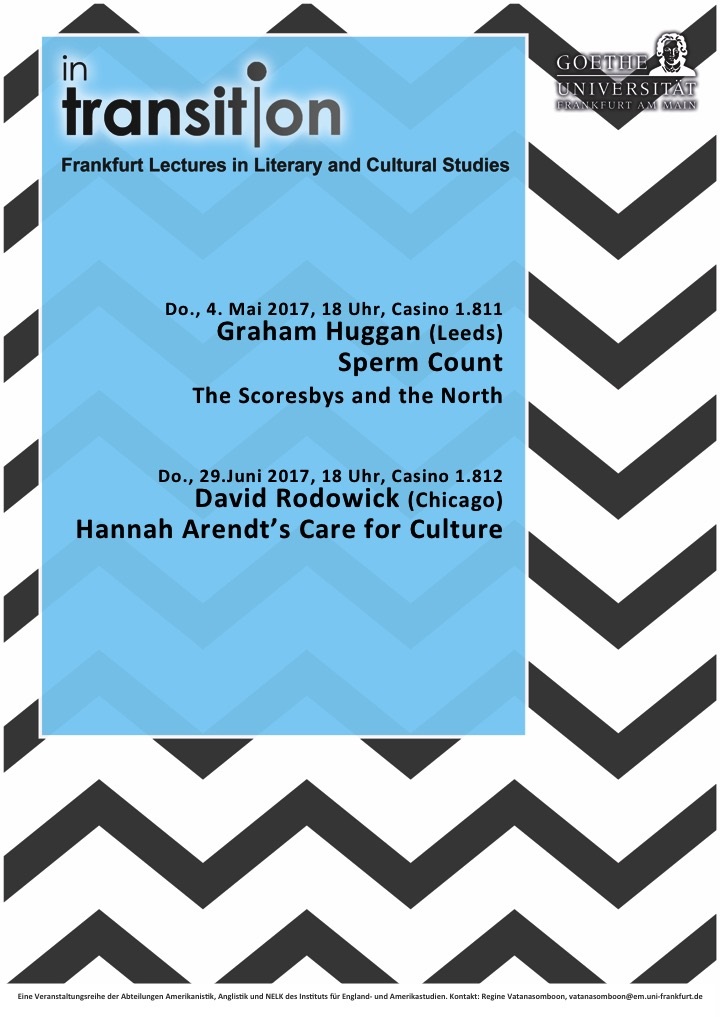 Graham Huggan is a Professor of Commonwealth and Postcolonial Literatures at the University of Leeds. He is one of the key proponents of postcolonial studies, having authored some of the most influential books in the field.
Graham Huggan is a Professor of Commonwealth and Postcolonial Literatures at the University of Leeds. He is one of the key proponents of postcolonial studies, having authored some of the most influential books in the field.
His Recent publications include Nature’s Saviours: Celebrity Conservationists in the Television Age (Routledge, 2013), which won an honourable mention for the 2014 ESSE Book Prize, and the 300,000-word Oxford Handbook of Postcolonial Studies (Oxford University Press, 2013), which he sole-edited and includes contributions from top postcolonial scholars from across the world. Other books include The Postcolonial Exotic: Marketing the Margins (Routledge, 2001), Australian Literature: Postcolonialism, Racism, Transnationalism (Oxford University Press, 2007), Extreme Pursuits: Travel/Writing in an Age of Globalization (University of Michigan Press, 2009), and the co-authored Postcolonial Ecocriticism: Literature, Animals, Environment (Routledge, 2010; second edition 2015). A revised collection of his own essays, Interdisciplinary Measures, which came out in 2008 with Liverpool University Press, demonstrates his ongoing commitment to cross-disciplinary approaches to postcolonial studies, as is also confirmed by the book series for which he is founding co-editor, ‚Postcolonialism across the Disciplines‘ (also Liverpool University Press).
He also specializes in environmental humanities (including animal studies), tourism studies (especially travel writing), short fiction and contemporary film. He is currently working on two contracted books: The Cetacean Quartet, a monograph on whales (Bloomsbury Press), and Land Lines, a co-authored study of modern British nature writing (Cambridge University Press).




